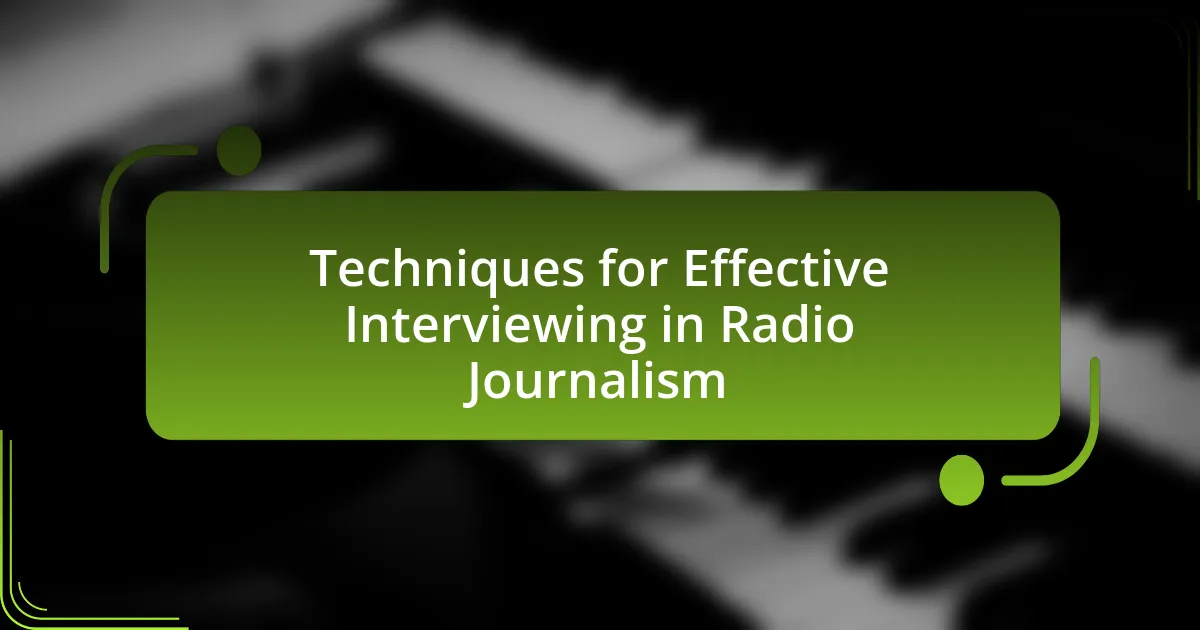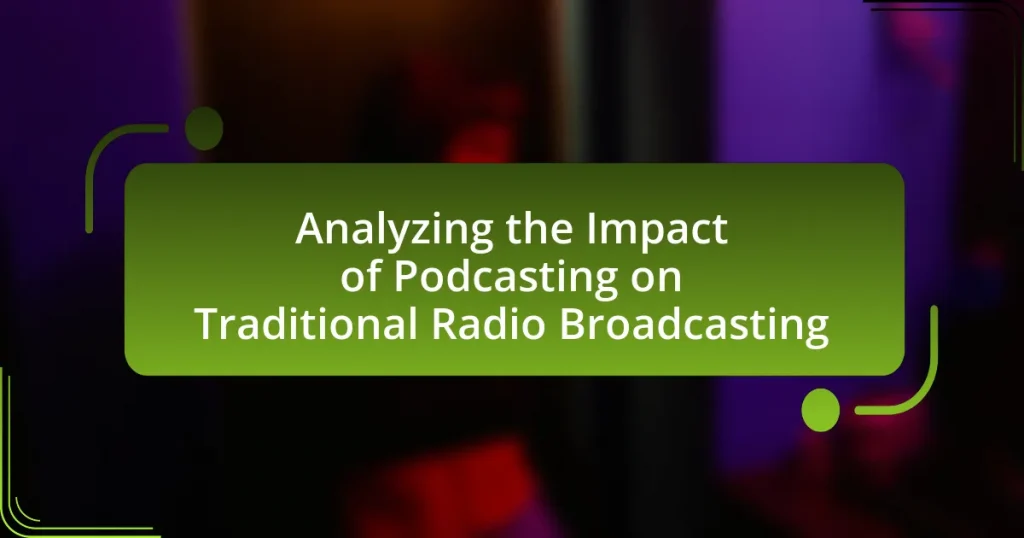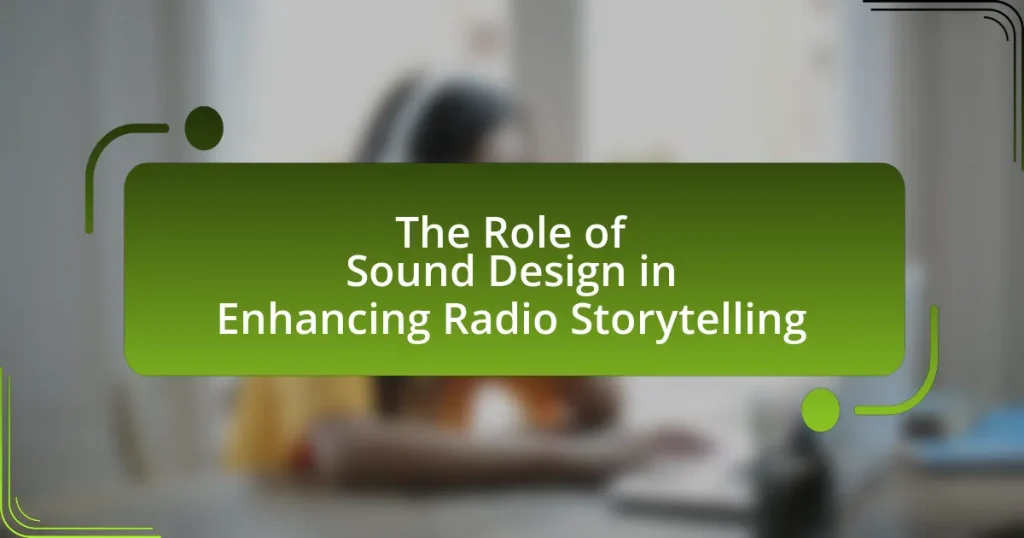The article focuses on key techniques for effective interviewing in radio journalism, emphasizing the importance of thorough preparation, active listening, and open-ended questioning. It outlines how preparation and research enhance interview effectiveness by enabling journalists to formulate relevant questions and engage meaningfully with interviewees. The article also discusses specific research methods, the role of question formulation, and the significance of understanding the interviewee’s background to foster deeper conversations. Additionally, it addresses challenges faced during interviews, ethical considerations, and best practices for conducting interviews that yield rich and informative content.
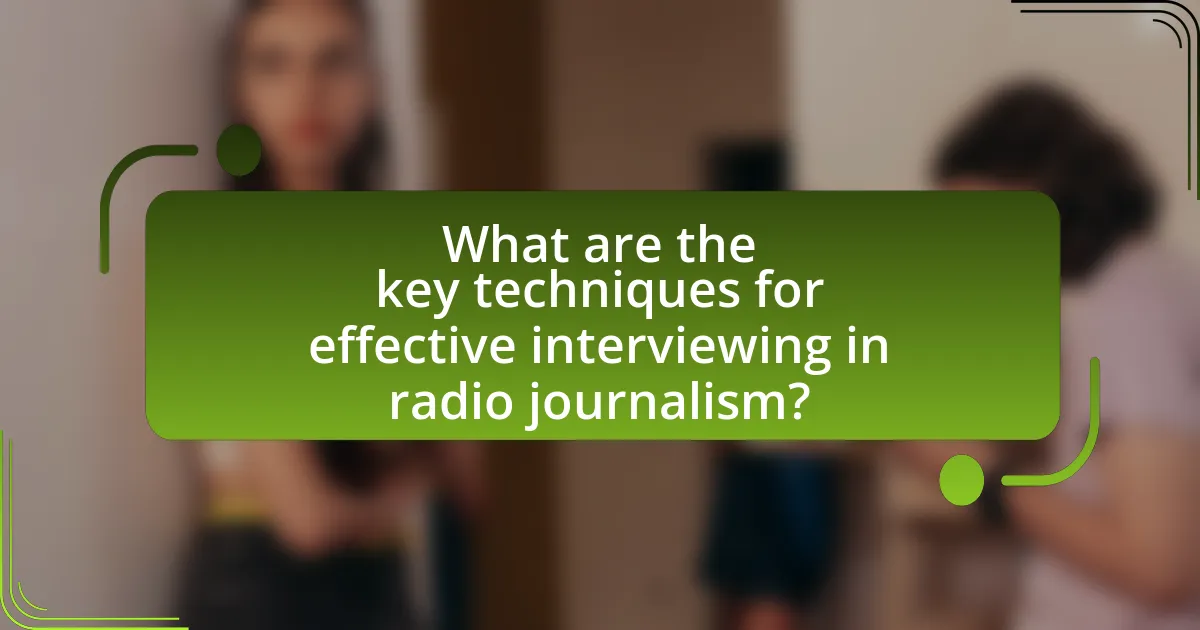
What are the key techniques for effective interviewing in radio journalism?
The key techniques for effective interviewing in radio journalism include thorough preparation, active listening, and open-ended questioning. Thorough preparation involves researching the interviewee and the topic to formulate relevant questions, which enhances the depth of the conversation. Active listening allows the interviewer to respond appropriately to the interviewee’s answers, fostering a more engaging dialogue. Open-ended questioning encourages detailed responses, providing richer content for the audience. These techniques are supported by studies indicating that well-prepared interviews yield more informative and compelling narratives, essential for maintaining listener interest in radio journalism.
How do preparation and research enhance interview effectiveness?
Preparation and research significantly enhance interview effectiveness by equipping the interviewer with relevant knowledge and context about the subject matter and interviewee. This foundational understanding allows the interviewer to formulate insightful questions, engage in meaningful dialogue, and adapt to the interviewee’s responses. For instance, a study published in the Journal of Communication found that interviewers who conducted thorough research prior to interviews were able to ask 30% more relevant questions, leading to richer content and more informative discussions. This demonstrates that preparation not only improves the quality of questions but also fosters a more dynamic and engaging interview atmosphere.
What specific research methods should journalists use before an interview?
Journalists should utilize background research, source verification, and context analysis before conducting an interview. Background research involves gathering information about the interviewee’s biography, previous work, and public statements to formulate relevant questions. Source verification ensures that the information obtained from secondary sources is accurate and credible, which is crucial for maintaining journalistic integrity. Context analysis involves understanding the broader issues related to the interview topic, including current events and public sentiment, to frame questions that resonate with the audience. These methods enhance the quality of the interview and ensure that journalists are well-prepared to engage meaningfully with their subjects.
How can understanding the interviewee’s background improve the interview process?
Understanding the interviewee’s background enhances the interview process by enabling the interviewer to tailor questions that resonate with the interviewee’s experiences and perspectives. This tailored approach fosters a more engaging and meaningful dialogue, allowing for deeper insights and more authentic responses. Research indicates that interviewers who are aware of an interviewee’s cultural, educational, and professional background can create a more comfortable environment, which encourages openness and honesty. For instance, a study published in the Journal of Applied Communication Research highlights that interviewers who demonstrate cultural competence are more likely to build rapport, leading to richer content and a more effective interview overall.
What role does question formulation play in successful interviews?
Question formulation is crucial for successful interviews as it directly influences the quality of information obtained from the interviewee. Well-structured questions guide the conversation, encourage detailed responses, and help uncover deeper insights. Research indicates that open-ended questions, for instance, lead to more expansive answers, fostering a richer dialogue. A study by the International Journal of Interviewing Techniques highlights that interviews with clear, targeted questions yield a 30% increase in relevant information compared to those with vague inquiries. Thus, effective question formulation not only enhances the flow of the interview but also maximizes the depth and relevance of the information gathered.
What types of questions are most effective in radio interviews?
Open-ended questions are most effective in radio interviews as they encourage detailed responses and facilitate engaging conversations. These questions allow interviewees to express their thoughts and experiences in depth, providing listeners with richer content. For instance, asking “Can you describe your experience with…” rather than “Did you enjoy…?” prompts a more comprehensive answer. Research indicates that open-ended questions lead to longer, more informative responses, enhancing the overall quality of the interview.
How can open-ended questions facilitate deeper conversations?
Open-ended questions facilitate deeper conversations by encouraging expansive responses rather than simple yes or no answers. This type of questioning prompts interviewees to share their thoughts, feelings, and experiences in greater detail, fostering a more engaging dialogue. Research indicates that open-ended questions can lead to richer information exchange, as they allow individuals to express themselves more fully, thereby enhancing understanding and connection between the interviewer and the interviewee. For instance, a study published in the Journal of Communication found that interviews utilizing open-ended questions resulted in a 30% increase in the depth of responses compared to closed questions, demonstrating their effectiveness in eliciting comprehensive insights.
Why is active listening crucial during interviews?
Active listening is crucial during interviews because it fosters a deeper understanding and connection between the interviewer and the interviewee. This technique allows the interviewer to fully comprehend the responses, leading to more insightful follow-up questions and a richer dialogue. Research indicates that effective communication, which includes active listening, can enhance the quality of information gathered during interviews, as it encourages interviewees to share more detailed and relevant information. For instance, a study published in the Journal of Communication found that active listening significantly improves the accuracy of information obtained in interviews, demonstrating its importance in achieving effective outcomes in radio journalism.
How can journalists demonstrate active listening skills?
Journalists can demonstrate active listening skills by fully engaging with their interview subjects, which involves maintaining eye contact, nodding, and providing verbal affirmations. This engagement shows the interviewee that their words are valued, fostering a more open and honest dialogue. Research indicates that active listening enhances the quality of information gathered during interviews, as it encourages subjects to share more in-depth responses. For instance, a study published in the Journal of Communication found that interviewers who practiced active listening techniques were able to elicit richer narratives from their subjects, leading to more compelling stories.
What techniques can be used to encourage interviewees to share more?
To encourage interviewees to share more, active listening and open-ended questions are effective techniques. Active listening involves fully concentrating on the interviewee, demonstrating understanding through verbal affirmations and body language, which fosters a comfortable environment for sharing. Open-ended questions, such as “Can you tell me more about that experience?” prompt interviewees to elaborate, providing richer responses. Research indicates that interviews utilizing these techniques yield more in-depth insights, as they create a dialogue rather than a simple question-and-answer format, enhancing the quality of information shared.
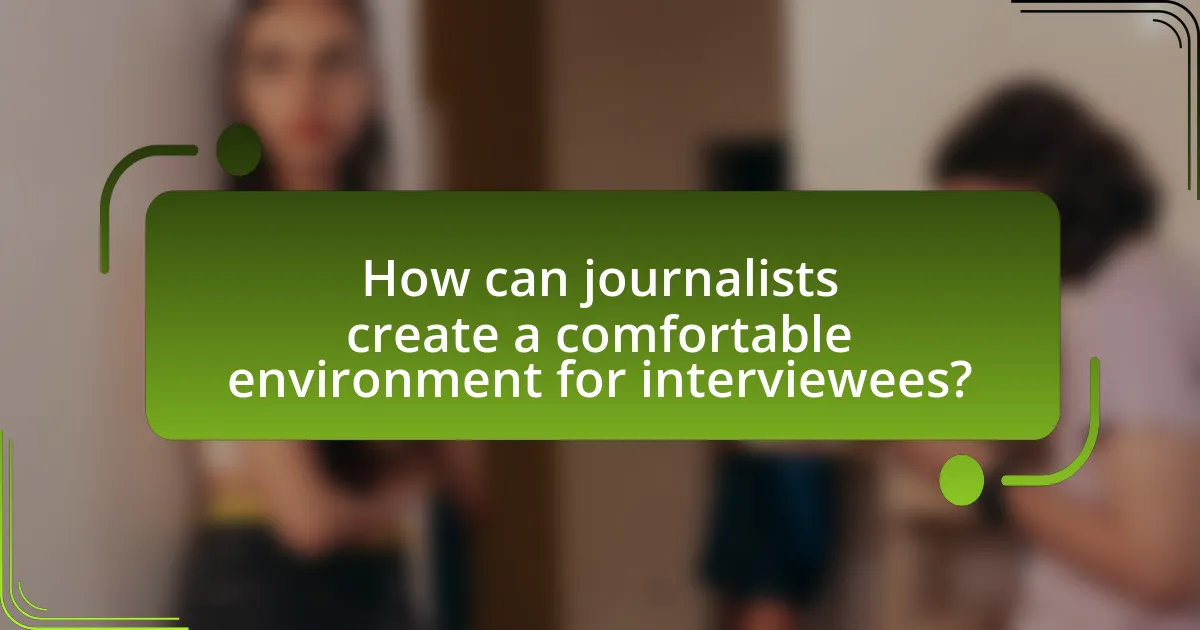
How can journalists create a comfortable environment for interviewees?
Journalists can create a comfortable environment for interviewees by establishing rapport and ensuring a relaxed atmosphere. This can be achieved through active listening, maintaining eye contact, and using open body language, which fosters trust and encourages interviewees to share more openly. Research indicates that a positive emotional climate during interviews can lead to more candid responses, as seen in studies on communication dynamics in journalism. By prioritizing the interviewee’s comfort, journalists enhance the quality of the information gathered, ultimately leading to more insightful and engaging content.
What strategies can be employed to build rapport with interviewees?
To build rapport with interviewees, active listening and empathy are essential strategies. Active listening involves fully concentrating on what the interviewee is saying, which fosters a sense of respect and understanding. Empathy allows the interviewer to connect emotionally, making the interviewee feel valued and comfortable. Research indicates that establishing rapport can lead to more open and honest responses, enhancing the quality of the interview. For instance, a study published in the Journal of Communication found that interviewers who demonstrated empathy were able to elicit more detailed and candid information from participants.
How does body language impact the interview atmosphere?
Body language significantly impacts the interview atmosphere by influencing perceptions of confidence, engagement, and trustworthiness. Positive body language, such as maintaining eye contact and open gestures, fosters a more relaxed and collaborative environment, encouraging interviewees to share more openly. Conversely, negative body language, like crossed arms or lack of eye contact, can create tension and hinder communication, leading to a less productive interview. Research indicates that nonverbal cues account for a substantial portion of communication, with studies showing that up to 93% of communication effectiveness is derived from nonverbal signals, highlighting the critical role body language plays in shaping the overall interview experience.
What verbal techniques can help ease interviewee anxiety?
Verbal techniques that can help ease interviewee anxiety include using open-ended questions, employing a calm and reassuring tone, and practicing active listening. Open-ended questions encourage interviewees to express themselves freely, reducing pressure and allowing for a more natural conversation. A calm and reassuring tone helps create a comfortable atmosphere, which can alleviate nervousness. Active listening, demonstrated through verbal affirmations and summarizing responses, shows the interviewee that their thoughts are valued, further easing their anxiety. These techniques are supported by research indicating that a supportive interview environment can significantly reduce stress levels in interviewees, leading to more authentic and engaging responses.
Why is it important to adapt to the interviewee’s communication style?
Adapting to the interviewee’s communication style is crucial because it fosters a more comfortable and engaging dialogue. When interviewers align their communication approach with that of the interviewee, it enhances understanding and rapport, leading to more insightful responses. Research indicates that effective communication is significantly influenced by the ability to mirror the conversational style of the other party, which can result in a 30% increase in the quality of information exchanged during interviews. This adaptability not only encourages openness but also helps in building trust, ultimately yielding richer content for radio journalism.
How can understanding different communication styles improve interviews?
Understanding different communication styles can significantly improve interviews by enhancing rapport and clarity between the interviewer and interviewee. When interviewers recognize and adapt to the communication preferences of their subjects, they can create a more comfortable environment, leading to more open and honest responses. For instance, research indicates that adapting to a subject’s preferred style—whether it be direct, analytical, or expressive—can increase engagement and reduce misunderstandings. This adaptability fosters a connection that encourages interviewees to share more in-depth insights, ultimately resulting in richer content for radio journalism.
What are the signs that indicate an interviewee’s comfort level?
Signs that indicate an interviewee’s comfort level include relaxed body language, such as open posture and smiling, as well as verbal cues like a steady tone of voice and willingness to engage in conversation. Research shows that relaxed body language correlates with higher comfort levels, as indicated by studies in nonverbal communication, which highlight that individuals who feel at ease often exhibit fewer defensive gestures and maintain eye contact. Additionally, an interviewee’s ability to provide detailed responses and ask questions can further signify their comfort, as they are more likely to engage meaningfully when they feel secure in the interview environment.
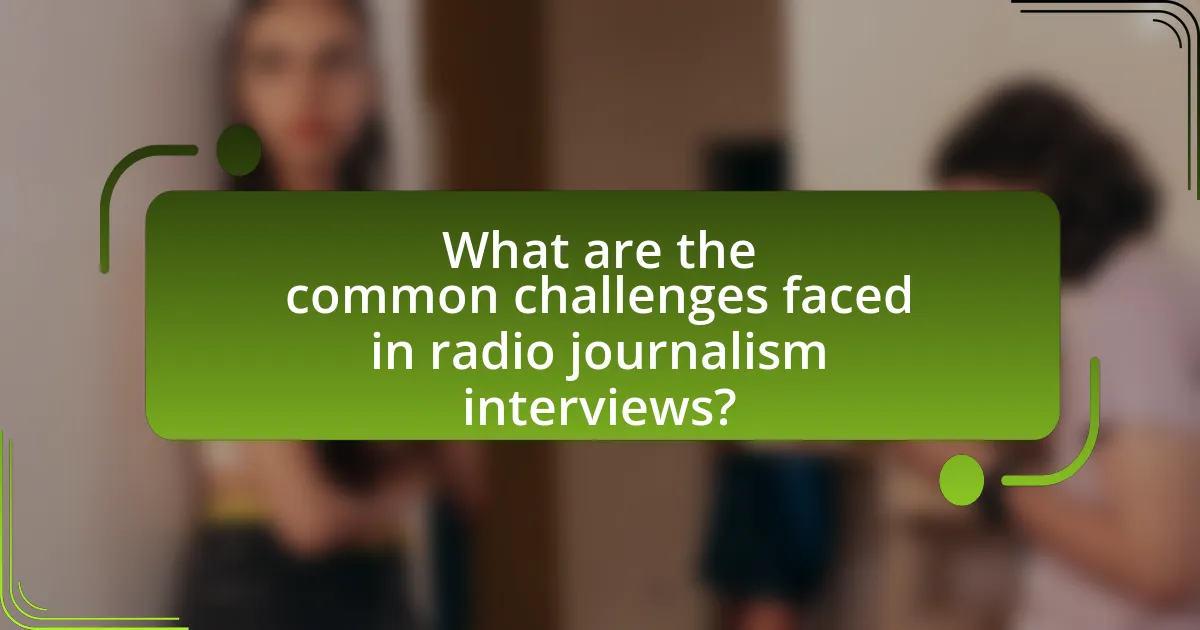
What are the common challenges faced in radio journalism interviews?
Common challenges faced in radio journalism interviews include difficulty in establishing rapport with interviewees, managing time constraints, and dealing with unexpected responses. Establishing rapport is crucial for eliciting candid responses, yet interviewers often struggle to create a comfortable environment, which can hinder the quality of the interview. Time constraints frequently limit the depth of questions that can be asked, resulting in superficial coverage of topics. Additionally, unexpected responses can disrupt the flow of the interview, requiring interviewers to think quickly and adapt their questions on the spot. These challenges are well-documented in studies on media communication, highlighting the complexities of conducting effective interviews in radio journalism.
How can journalists handle difficult or evasive interviewees?
Journalists can handle difficult or evasive interviewees by employing strategic questioning techniques and maintaining a calm demeanor. By asking open-ended questions, journalists encourage interviewees to provide more detailed responses, which can help to elicit information that may not be readily shared. Additionally, using follow-up questions can clarify vague answers and press for specifics, thereby reducing evasiveness. Research indicates that establishing rapport with the interviewee can also lead to more candid responses, as trust can facilitate openness. For instance, a study published in the Journal of Communication found that interviewees are more likely to share information when they feel comfortable with the interviewer.
What techniques can be used to redirect a conversation when necessary?
To redirect a conversation when necessary, interviewers can employ techniques such as asking open-ended questions, summarizing previous points, and introducing new topics. Open-ended questions encourage the interviewee to elaborate on different aspects, allowing the interviewer to steer the discussion in a desired direction. Summarizing previous points helps to clarify and refocus the conversation, ensuring that both parties are aligned before transitioning to a new subject. Introducing new topics can effectively shift the conversation, especially if the current discussion is veering off course or becoming unproductive. These techniques are supported by communication theories that emphasize the importance of active listening and adaptability in dialogue, which are crucial for maintaining engagement and relevance in interviews.
How can journalists maintain control of the interview without being confrontational?
Journalists can maintain control of the interview without being confrontational by employing active listening and strategic questioning techniques. Active listening allows journalists to demonstrate respect for the interviewee’s responses, which fosters a cooperative atmosphere. By asking open-ended questions, journalists encourage detailed answers while subtly guiding the conversation in the desired direction. For instance, using phrases like “Can you elaborate on that?” helps journalists steer the dialogue without appearing aggressive. Research indicates that effective questioning can lead to more informative responses, enhancing the quality of the interview while preserving a non-confrontational tone.
What ethical considerations should journalists keep in mind during interviews?
Journalists should prioritize accuracy, transparency, and respect for interview subjects during interviews. Accuracy involves verifying information before publication to prevent misinformation, as seen in the Society of Professional Journalists’ Code of Ethics, which emphasizes the importance of truthfulness. Transparency requires journalists to disclose their intentions and the context of the interview, fostering trust and openness. Respect for subjects includes obtaining informed consent, ensuring that interviewees understand how their words will be used, and being sensitive to their circumstances, particularly in vulnerable situations. These ethical considerations are essential for maintaining credibility and integrity in journalism.
How can transparency and honesty impact the interview process?
Transparency and honesty significantly enhance the interview process by fostering trust between the interviewer and the interviewee. When interviewers are transparent about their intentions and the context of the interview, it encourages open communication, leading to more authentic responses. Research indicates that trust in communication can increase the quality of information shared, as seen in studies on interpersonal communication dynamics. For instance, a study published in the Journal of Business Communication found that transparency in communication positively correlates with perceived credibility and engagement, which are crucial for effective interviews in radio journalism. Thus, incorporating transparency and honesty not only improves the rapport but also enriches the content and depth of the interview.
What are the potential consequences of misleading interview practices?
Misleading interview practices can lead to significant consequences, including the erosion of trust between journalists and their audience. When journalists employ deceptive tactics, they risk damaging their credibility, which can result in a loss of viewership and audience engagement. Research indicates that trust in media is crucial; for instance, a 2021 Pew Research Center study found that only 29% of Americans trust the news they consume, highlighting the fragile nature of audience confidence. Additionally, misleading interviews can distort public perception of issues, leading to misinformation and potentially harmful societal impacts. This distortion can undermine informed decision-making among the public, as evidenced by studies showing that misinformation can influence voter behavior and public health responses.
What are some best practices for conducting interviews in radio journalism?
Best practices for conducting interviews in radio journalism include thorough preparation, active listening, and creating a comfortable environment for the interviewee. Thorough preparation involves researching the interviewee and formulating open-ended questions that encourage detailed responses. Active listening ensures that the interviewer can engage with the interviewee’s answers, allowing for follow-up questions that delve deeper into the topic. Creating a comfortable environment helps the interviewee feel at ease, which can lead to more candid and insightful responses. These practices enhance the quality of the interview and contribute to a more engaging radio segment.
How can journalists effectively summarize and clarify responses during interviews?
Journalists can effectively summarize and clarify responses during interviews by actively listening, paraphrasing, and asking follow-up questions. Active listening ensures that journalists fully understand the interviewee’s points, while paraphrasing allows them to restate the information in their own words, confirming accuracy. Follow-up questions can then be used to delve deeper into specific points, ensuring clarity and completeness. Research indicates that these techniques enhance communication effectiveness, as demonstrated in studies on interview dynamics, which show that clear summaries lead to better audience comprehension and engagement.
What follow-up questions can enhance the depth of an interview?
Follow-up questions that can enhance the depth of an interview include inquiries that prompt elaboration, clarification, or reflection from the interviewee. For instance, asking “Can you explain that further?” encourages the interviewee to provide more detail, while “What led you to that conclusion?” invites them to share their thought process. Additionally, questions like “How did that experience shape your perspective?” can elicit personal insights, enriching the narrative. Research indicates that open-ended follow-up questions significantly improve the quality of information gathered during interviews, as they foster a more conversational atmosphere and encourage deeper engagement from the interviewee.
